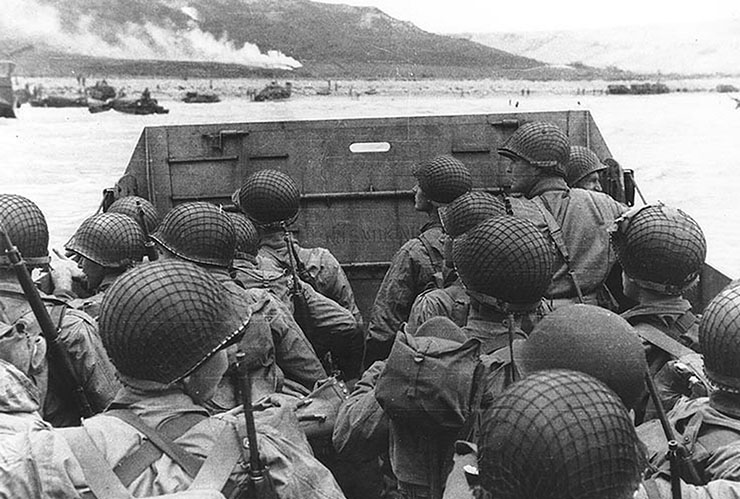The invasion of Normandy was launched 80 years ago. On June 6, 1944, the Western Allies brought together massive land, air, and sea forces in the largest amphibious landing in history, breaching Hitler’s Fortress Europe. Operation Overlord was a highly complex endeavor which hastened the collapse of the Third Reich. It was not a turning point in World War II, however, as claimed by President Barack Obama on the event’s 70th anniversary in 2014.
Contemporary politicians and military historians of repute may differ about the exact “turning point,” but they all agree that it came long before the Normandy landings. Arguably it was Germany’s attack on the Soviet Union on June 22, 1941—famously codenamed Operation Barbarossa—that sealed the fate of the “Thousand Year Reich.” Hitler repeated Napoleon’s fatal mistake of 1812 by attacking Russia in the east, with no clear endgame in mind, while Britain remained unconquered and implacably hostile in the west.
In December 1941, when the German offensive ran out of steam at the gates of Moscow—and when Hitler inexplicably declared war on the United States—the geostrategic game was up. From June 22 through Dec. 10, 1941 it was clear that Germany could no longer win the war. By the end of 1941 there was no conceivable scenario even for a draw. For the remaining three and a half years of bloodshed, Germany’s eventual defeat was merely a matter of time.
For most informed laymen of our time, however, and overwhelmingly for those who lived through it, the battle of Stalingrad marked the turning point in the war. In Marshal Georgi Zhukov’s brilliantly planned and executed Operation Uranus (Nov. 1942) the Red Army replicated, on a grand strategic scale, Hannibal’s double envelopment at the battle of Cannae—every field commander’s dream for the two millennia that followed it. The Red Army destroyed the entire Sixth Army of the Wehrmacht and a Panzer army to boot. This left “a massive hole in the Eastern Front,” notes historian David Glantz; “the Germans never fully recovered from it.” Sir Max Hastings agrees: “Stalingrad changes everything. Once the Germans have been thrown back from Stalingrad, once they’d lost that battle, then after that the war never looked the same again.”
The Germans and their Italian, Hungarian, Romanian and Croatian allies suffered more than one million casualties at Stalingrad, which is more than the total strength of the Wehrmacht opposing the Allies in the West after Normandy. More Red Army soldiers—close to 480,000—died in the defense of the city on the Volga than Americans (416,800) in the entire war, the Pacific included. As Antony Beevor has pointed out, in November 1944, with the Reich in its death throes, Hitler blamed Stalingrad for Germany’s impending demise.
Hitler was wrong. As early as January 1942 Germany was strategically finished. In 1943 its manpower losses in the East, most notably at Kursk, were colossal and irreplaceable. By the time of the Normandy landings it was already defeated, having suffered four-fifths of its casualties on the Eastern Front. The Western Allies had scored impressive victories in North Africa and killed most of Admiral Doenitz’s U-boat wolf packs in the Atlantic in the spring of 1943. In the early months of 1944, at long last, American long-range fighters accompanying daytime bomber formations destroyed the ability of the Luftwaffe to defend German cities and factories.
The fatal strategic blow to Germany came from the East, however. In the summer of 1944, in two months, the Red Army’s Operation Bagration destroyed more German soldiers and weaponry than the entire Allied campaign from the Normandy landings until the end of the war. Little known outside of Russia, it resulted in the complete destruction of 28 of 34 divisions of the German Third Panzer, Fourth, and Ninth Armies of Army Group Center. Operation Bagration gutted German forces in the East and, by August 1944, brought the Red Army to the Vistula River, just across from Warsaw and within striking distance of Berlin.
Had there been no Normandy landings, the Red Army would have reached the English Channel at some point between early to mid-1946. The fact that this did not happen is the true significance of the Overlord. D-Day was not a turning point of the Second World War. It was the first and arguably the most decisive operation of the Cold War.

Leave a Reply